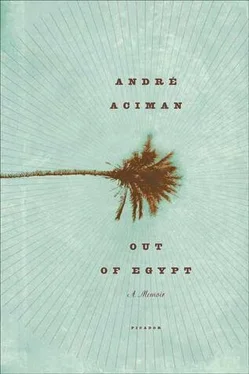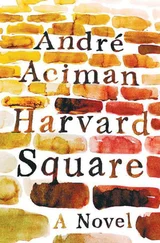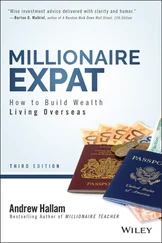This was an oblique reference to Uncle Isaac, who, while studying at the University of Turin, had managed to become a very close friend of a fellow student named Fouad, the future king of Egypt. Both men spoke Turkish, Italian, German, some Albanian, and, between them, had concocted a pidgin tongue, rich in obscenities and double entendres, that they called Turkitalbanisch and which they continued to speak into their old age. It was because Uncle Isaac staked all of his hopes on this undying friendship that he had eventually persuaded his parents and siblings to sell everything in Constantinople and move to Alexandria.
Uncle Vili was fond of boasting that his brother — and, by implication, himself as well—“owned” the king. “He has the king in his breast pocket,” he would say, pointing to his own breast pocket, in which a silver cigarette case bearing the king’s seal was permanently lodged. In the end, it was the king who introduced Isaac to the man who was to play such a significant role in his sister’s life.
Aunt Marta, who was nearing forty at the time, was eventually married to this man, a rich Swabian Jew whom everyone in the family called “the Schwab”—his real name was Aldo Kohn — and who did little else but play golf all day, bridge at night, and in between smoked Turkish cigarettes on which his name and family crest had been meticulously inscribed in gold filigree. He was a balding, corpulent man whom Marta had turned down ten years earlier but who was determined to pursue her again and, better yet, without demanding a dowry, which suited everyone. At one of the family gatherings, it was arranged to leave the would-be’s alone for a while, and before Marta knew what the Schwab was about, or even had time to turn around and pull herself away, he had grabbed hold of her wrist and fastened around it a lavish bracelet on the back of which his jeweler had inscribed M’appari, after the famous aria from von Flotow’s Martha. Aunt Marta was so flustered she did not realize she had broken into tears, which so moved the poor Schwab that he too started to weep, begging as he sobbed, “Don’t say no, don’t say no.” Arrangements were made, and soon enough everyone noticed an unusually serene and restful glow settle upon Aunt Marta’s rosy features. “She’ll kill him at this rate,” her brothers snickered.
The Schwab was a very dapper but quiet man who had once studied the classics and whose diffident manner made him the butt of household ridicule. He seemed spoiled and stupid, a sure sap, and probably that way as well. The brothers had their eyes on him. But the Schwab was no fool. Although he had never worked a day in his life, it was soon discovered that in the space of two years he had trebled his family’s fortune on the sugar exchange. When Uncle Vili realized that this incompetent, sniveling, beer keg of a brother-in-law was a “player,” he immediately drew up a list of no-risk ventures for him. But the Schwab, who attributed his financial wizardry to luck more than to skill, was reluctant to invest in stocks because he didn’t understand a thing about the market. All he understood was sugar, and maybe horses. “Understand?” responded Uncle Vili. “Why should you understand the stock market? I’m here to do it for you.” After all, were they or weren’t they all related to each other now?
For weeks the Schwab tolerated his brother-in-law’s inducements until, one day, he finally exploded. And he did so in style: he borrowed Vili’s cherished little phrase, spun it about him awhile like a bodkin to let Vili know that he, the Schwab, known to the rest of the world as Aldo Kohn, and more specifically as Kohn Pasha, was no pushover either. Uncle Vili was totally trumped. Not only was he pained —that was his word for it — by his brother-in-law’s mistrust, but there was something unbearably vexing in having been flayed with his own knife. It was a low, unsportsmanlike thing to do; it was just another instance of Ashkenazi duplicity. Uncle Vili rarely spoke to him again.
An exception occurred in 1930, when it became obvious that the family had been cheated of the prosperous twenties. It was at about this time that Uncle Vili suggested the family emigrate elsewhere. America? Too many Jews already. England? Too rigid. Australia? Too underdeveloped. Canada? Too cold. South Africa? Too far. It was finally decided that Japan offered ideal prospects for men whose claim to fortune was their exalted, millennial role as itinerant peddlers and master mountebanks.
The Japanese had three advantages: they were hardworking, they were eager to learn and compete, and they had probably never seen Jews before. The brothers picked a city they had never heard of but whose name sounded distantly, and reassuringly, Italian: Nagasaki. “Are you going to peddle baubles and mirrors too?” asked the Schwab. “No. Cars. Luxury cars.” “Which cars?” he asked. “Isotta-Fraschini.” “Have you ever sold cars before?” He enjoyed ribbing the clannish brothers whenever he could. “No. Not cars. But we’ve sold everything else. Rugs. Stocks. Antiques. Gold. Not to mention hope to investors, sand to the Arabs. You name it. And besides, what difference does it make?” asked an exasperated Vili. “Carpets, cars, gold, silver, sisters, it’s all the same thing. I can sell anything,” he bragged.
The Isotta-Fraschini affair started with everyone in the family rushing to invest in the Middle Eastern and Japanese distributorship for the cars. A Japanese tutor was hired, and on Monday and Thursday afternoons, all five brothers — from Nessim, the oldest, who was over fifty and not entirely convinced about the venture, to Vili, twenty years younger and the demonic propounder of the scheme — would sit in the dining room, their notebooks filled with what looked like the most slovenly ink stains. “Poor boys,” Aunt Marta would whisper to her sister Esther whenever she peeped into the dark, wood-paneled room where tea was being served to the classroom. “They haven’t even mastered Arabic yet, and now these confounded sounds.” Everyone was terror-struck. “Raw fish and all that rice every day! Death by constipation it’s going to be. What must we endure next?” was Aunt Clara’s only comment. There would be no more time for painting, she was warned. She would have to help in the family business. “Besides, all you’ve ever painted are portraits of Tolstoy. It’s time to change,” commented Uncle Isaac.
Their mother was also worried. “We build on bad soil. Always have, always will. God keep us.”
Out of spite, no one in the family had ever asked the Schwab to invest a penny in the venture. His punishment would be to witness the clan grow tremendously rich, and finally realize, once and for all, who was and who wasn’t.
Two years later, however, he was approached by his wife and asked to contribute something toward the immediate expenses of the firm. The Schwab, who, aside from gambling, hated to invest in intangibles, agreed to help by buying one of these expensive cars at a discount. It soon emerged that, aside from giving each of the five brothers a car, the newly established Isotta-Fraschini Asia-Africa Corporation had sold only two cars. Three years later, after the business collapsed and the demos were returned to Italy, only two persons in Egypt could be seen riding Isotta-Fraschinis: the Schwab and King Fouad.
The Isotta-Fraschini debacle set the family back by a decade. The clan continued to keep up appearances, and its members were often seen Sundaying in the king’s gardens or arriving in chauffeured cars at the exclusive Sporting Club, but they were flat broke. Too vain to admit defeat, and too prudent to start baiting their creditors, they began tapping second-tier friends and relatives who could be relied on to keep their secret. Albert, their other brother-in-law, a once-prosperous cigarette manufacturer who had abandoned everything he owned in Turkey to move to Egypt, was asked to contribute something toward family finances. He did so reluctantly and after terrible rows with Esther, his wife, who, like her sister Marta, never doubted that blood was thicker than marriage vows.
Читать дальше












